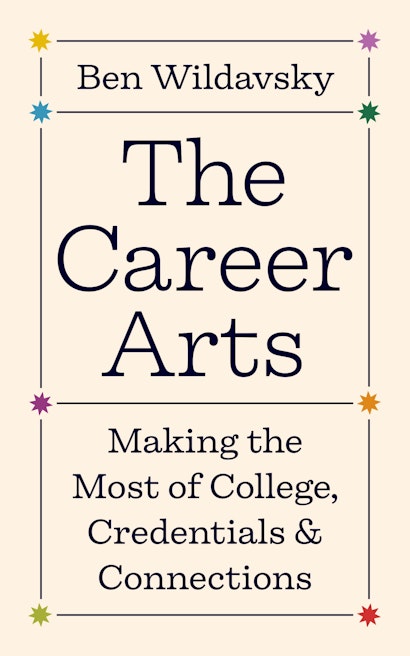The story of how a particular set of ideas eventually turns into a book can sometimes be a tale all its own. My first book for Princeton University Press, The Great Brain Race, grew from an ill-fated freelance magazine article in the late 1990s that never made it into print. I turned to other topics. By the time I returned to international student mobility and global higher education a decade later, my ideas had evolved in a different direction. This time, I was relieved to discover, they were publishable.
The creation of my new PUP book, The Career Arts: Making the Most of College, Credentials, and Connections, has been more a matter of poking and prodding a set of ideas and assumptions about education and careers over time. I had never focused on the connection between college and the workforce, but I had certainly paid attention to the growing debate about whether college is worth what it costs. Some years back, I began delving into the conversation about broad education versus targeted vocational skills.
In a blog post for the Chronicle of Higher Education, for instance, I questioned the premise that colleges can’t offer students both pure intellectual inquiry and practical career preparation. I recalled a classic 1976 Saturday Night Live parody featuring an ad for New Shimmer, a fictional product in a spray can. The late great Gilda Radner proclaimed that New Shimmer was a floor wax. Dan Aykroyd insisted it was a dessert topping. Chevy Chase joined them and broke up the fight that ensued with a master-stroke of peacemaking and marketing: “New Shimmer’s a floor wax and a dessert topping!” Why, I concluded, can’t a university be devoted to the life of the mind and to improving graduates’ economic prospects?
A couple of years later, I explored a variation on this theme in a short essay called “Who Should Go to College? Beyond Semantic and False Dichotomies.” Writing for the think tank Education Sector, I argued that the sharp distinction critics make between traditional academic pursuits in college and career-oriented vocational alternatives often evaporates on closer examination. Going back at least to the creation of land-grant universities in the second half of the 19th century, U.S. universities have included plenty of highly practical offerings along with general-education basics. The ivory tower stereotype of rarefied intellectual specialization just doesn’t comport with the reality that many undergraduates study subjects like nursing, teaching, accounting, and computer science. Add widely used community colleges to the mix and the distinction between academic and career-focused studies becomes even blurrier.
These exploratory thoughts eventually came to inform my argument in The Career Arts that it’s time to move away from the unhelpful “either/or” approach to degrees and practical credentials, in favor of a “both/and” perspective. So did a series of (mostly) friendly debates with professional colleagues over the years. It seemed to me perfectly reasonable to criticize the shortcomings of higher education, from low graduation rates to resistance to innovation, without throwing the baby out with the bathwater. Yes, the economic payoff to college varies, whether by subject studied or by institutional effectiveness. Still, I found it hard to argue with the substantial body of research showing how changes in the economy over the past century had enormously increased the wage premium for degrees, even after a surge in the percentage of Americans attending and graduating from college. At one point I started sketching a book proposal defending the value of college against criticisms that struck me as unpersuasive despite their popularity. Yet it didn’t quite feel complete and, busy with other projects, I never got started.
It took a while longer, including a lot more reading, conversations, and interviews with podcast guests, for me to see how much need exists for high-quality alternatives to college. The challenge is to help young people and mid-career workers alike figure out how to separate the wheat from the chaff. At the same time, learners need to be shown how much the labor market values a mixture of broad education and targeted skills, rather than the siloed and misleading choice between vocational training and everything else. We should offer many more options for individuals to combine short-term, targeted credentials, obtained throughout their working lives, into degrees with demonstrated long-term value.
Along the way, I interviewed a podcast guest, Aimée Eubanks Davis, CEO of the nonprofit Braven, who was so engaging that I invited her to be my co-host for the next season of the show. I increasingly came to understand that social capital—the ability to access and mobilize networks—is a vital third element of career success. Without it, degrees and alternatives that provide targeted job skills are necessary but not sufficient tools for advancement. That’s particularly true for disadvantaged first-generation college students without strong inherited career networks.
With all these building blocks assembled, it might seem that The Career Arts would practically write itself. Not so. This essay, after all, appears on my publisher’s website. It took a key conversation with a PUP editor to help me see how the pieces could fit together into what readers might consider a persuasive and useful narrative. The path to publication was rewarding for me as an author, as I hope it will be for readers. With public confidence in higher education at an historic low, even as the economic returns to education are near record highs, it seems that the need to identify, develop, and spread important ideas about education and career success is greater than ever.
Ben Wildavsky is a visiting scholar at the University of Virginia’s School of Education and Human Development. He is the award-winning author of The Great Brain Race (Princeton) and coeditor of Reinventing Higher Education and Measuring Success. He is the host and coproducer of the Higher Ed Spotlight podcast.

